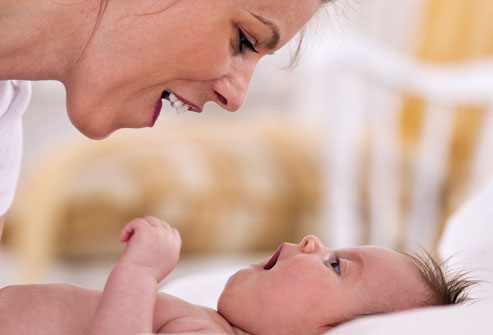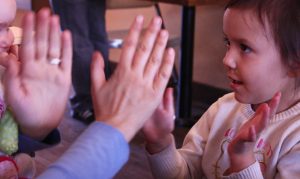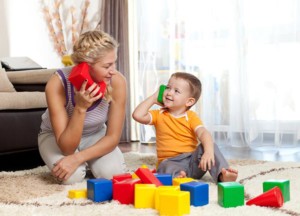
Say “Up, Please!” Encouraging Babies’ First Words Through Imitation
Every parent looks forward to our babies’ first words. We can’t wait for them to talk! Mark played his cards right, and his first word was “mama” when he was 12 months old. We know that most babies say their first word around one year (12 months) of age. Some babies may say their first word as early as 10 months of age; others may not say their first word until 13 months of age. What are some strategies for getting our little ones to speak?
The first thing is to get them to imitate us. If your child does not imitate your words, see if you can get her to imitate your actions.
One idea is to get your child to imitate you without using words. This is a good foundation for verbal turn-taking. Take an object like a car and roll it back and forth. See if your child will imitate you. If she doesn’t, gently roll her car back and forth and roll yours back and forth at the same time.
You can encourage your child to imitate you using blocks, musical instruments, plastic dishes and utensils, pretend food, and toy tools. Once your child consistently imitates your actions with these objects, she is moved toward imitating your words.
 You can also encourage your child to imitate communicative gestures. For example, you can wave and look at him expectantly. If he doesn’t wave, gently move his hand back and forth. Then try waving again, and see if he does it. Keep at it, and he will wave eventually! You can have him imitate gestures like clapping, high five, pointing, and knocking on the door. Have your child imitate more “big” movements such as blowing bubbles, dancing, kicking a ball, and others. There are more ideas for simple imitation games on the link below.https://www.educatall.com/page/956/Simple-imitation-games.html
You can also encourage your child to imitate communicative gestures. For example, you can wave and look at him expectantly. If he doesn’t wave, gently move his hand back and forth. Then try waving again, and see if he does it. Keep at it, and he will wave eventually! You can have him imitate gestures like clapping, high five, pointing, and knocking on the door. Have your child imitate more “big” movements such as blowing bubbles, dancing, kicking a ball, and others. There are more ideas for simple imitation games on the link below.https://www.educatall.com/page/956/Simple-imitation-games.html
You can have your child imitate non-speech sounds. For example, use toy animals and have them make sounds (e.g. cow mooing, cat meowing). I remember working with a 3-year-old girl who would not talk, but she would imitate animal noises. Imitating non-speech sounds helps your child progress toward imitating actual speech.
Once your child is speaking, it is okay to occasionally ask him to imitate you, especially when saying “please” and “thank you.” I started this with my son Mark when he was about 18 months old. He’d say “up!” and I’d say “Say ‘up, please!” It’s never too soon to start teaching good manners! Check out the link below for more ideas for building verbal imitation.
http://teachmetotalk.com/2012/04/05/building-verbal-imitation-in-toddlers/
For more ideas about stimulating your child’s speech and language, see my book Love Talk Read to Help Your Child Succeed, available on Amazon at ttps://www.amazon.com/Instant-Insights-Love-Child-Succeed/dp/1944177981/ref=sr_1_1?s=books&ie=UTF8&qid=1549238516&sr=1-1&keywords=celeste+roseberry+love+talk+read
ttps://www.amazon.com/Instant-Insights-Love-Child-Succeed/dp/1944177981/ref=sr_1_1?s=books&ie=UTF8&qid=1549238516&sr=1-1&keywords=celeste+roseberry+love+talk+read

